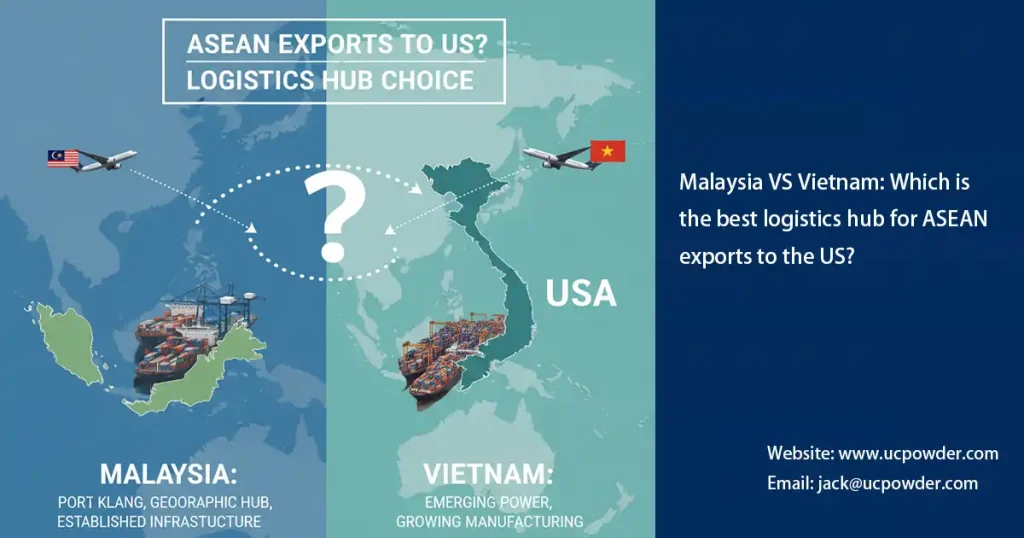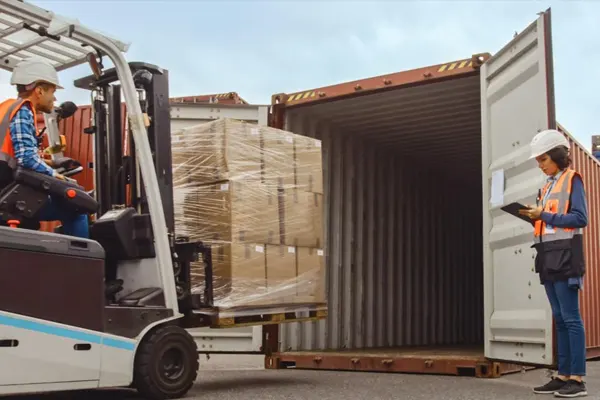Malaysia VS Vietnam: Which is the best logistics hub for ASEAN exports to the US?
Are you looking for the best logistics hub for ASEAN exports to the US? Choosing a logistics hub between Malaysia and Vietnam can significantly impact your supply chain efficiency, costs, and delivery times. As a leading Malaysian freight forwarder, we provide data-driven insights to help you optimize your ASEAN-US export strategy. Discover why Malaysian logistics hubs like Port Klang and Tanjung Pelepas excel in serving ASEAN exports to the US, and how we can provide seamless service for your ASEAN exports.

ASEAN exports to the US: Why choosing a logistics hub is crucial
Why Malaysia is the preferred logistics hub for ASEAN exports to the US ?
1. Unrivalled Port Efficiency: Port Klang and Port of Tanjung Pelepas
Malaysia’s Port Klang and Port of Tanjung Pelepas (PTP) are among the world’s top ports. According to the 2023 Container Port Performance Index (CPPI), PTP ranked fifth globally and one of ASEAN’s most efficient ports. PTP handles 12.5 million TEUs annually, with a record single-vessel handling of 14,914 TEUs in 2025, making it ideally suited to consolidating ASEAN exports to the US. In contrast, while Vietnam’s Cai Mep-Thi Vai Port (ranked seventh globally, handling 5.6 million TEUs annually) is rapidly improving, Malaysia offers faster turnaround times (20-30 days to Los Angeles) and seamless connectivity through the Strait of Malacca, serving the export needs of ASEAN countries.
2. Strategic location and ASEAN regional connectivity
3. Cost and time savings
4. Lower geopolitical risks
Comparison of international shipping between Malaysia and Vietnam
| Indicator | Malaysia | Vietnam | Advantageous Party |
|---|---|---|---|
| Port Efficiency (CPPI 2023) | PTP ranks 5th globally, ahead of Singapore, handling 12.5 million TEU annually, with a single ship record of 14,914 TEU. | Cai Mep-Thi Vai ranks 7th globally, Cat Lai ranks 20th, handling 5.6 million TEU annually, with rapid improvement. | Malaysia: Higher throughput, suitable for large alliances and ultra-large vessels. |
| Shipping Time (to Los Angeles) | 20-30 days (FCL, via Singapore). | 25-35 days (FCL, via Cai Mep). | Malaysia: Faster shipping, suitable for time-sensitive goods in Southeast Asia. |
| Shipping Cost (20ft FCL) | $3,000-$5,000 (electronics have a discount). | $2,500-$4,500 (textiles are cheaper). | Vietnam: Lower costs, suitable for large volume cargo from Southeast Asia. |
| Infrastructure Investment | $120 billion (Carey Island expansion), with a target of 36 million TEU. | $117 billion (ports, airports, highways). | Vietnam: Larger investment scale, strong future potential. |
| Geopolitical and Political Risks | Low (trade surplus of $270 billion), CPTTPP/RCEP member. | High (trade surplus of $105 billion, tariff risks > 40%). | Malaysia: More stable, benefits from FTA for exports to Southeast Asia. |
| ASEAN Regional Connectivity | Malacca-Kuantan bypass + Singapore transshipment, rail/air links are mature, servicing Southeast Asian countries (Indonesia, Thailand, etc.). | Inland connectivity is weak, relying on highways, servicing limited Southeast Asian countries. | Malaysia: Stronger ASEAN regional connectivity. |
Why choose our Malaysia freight forwarding services?
As a trusted freight forwarder in Malaysia, we specialize in ASEAN exports to the US, offering the following services:
- Customized freight solutions: Full-load/Least-Consumer (FCL/LCL), air freight, and multimodal transport tailored for ASEAN cargo (electronics, furniture, auto parts).
- FTA expertise: Leveraging Malaysia’s CPTPP and RCEP advantages to maximize tariff savings for ASEAN exporters.
- Real-time tracking: Monitor your ASEAN-US shipments through our digital logistics platform.
- Local ASEAN partners: Coordinate with Port Klang, PTP, and other ASEAN ports to expedite customs clearance, serving all 10 ASEAN countries.
Have Anything To Ask Us?
Please fill in your email in the form and we’ll get back to assist you soon!



